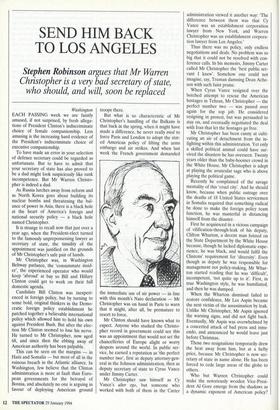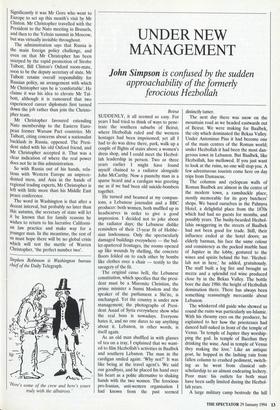SEND HIM BACK TO LOS ANGELES
Stephen Robinson argues that Mr Warren
Christopher is a very bad secretary of state, who should, and will, soon be replaced
Washington EACH PASSING week we are faintly amused, if not surprised, by fresh allega- tions of President Clinton's indiscriminate choice of female companionship. Less amusing is the increasing hard evidence of the President's indiscriminate choice of executive companionship.
To have made an error in your selection of defence secretary could be regarded as unfortunate. But to have to admit that your secretary of state has also proved to be a dud might look suspiciously like rank incompetence. But Mr Warren Christo- pher is indeed a dud.
As Russia lurches away from reform and as North Korea goes about building its nuclear bombs and threatening the bal- ance of power in Asia, there is a black hole at the heart of America's foreign and national security policy — a black hole named Christopher.
It is strange to recall now that just over a year ago, when the President-elect turned to the famously unprepossessing lawyer as secretary of state, the timidity of the appointment was justified on the grounds of Mr Christopher's safe pair of hands.
Mr Christopher was, in Washington Beltway parlance, the 'consummate insid- er', the experienced operator who would keep 'abroad' at bay so Bill and Hillary Clinton could get to work on their full domestic agenda.
Candidate Bill Clinton was inexperi- enced in foreign policy, but by turning to some bold, original thinkers in the Demo- cratic foreign policy establishment he patched together a believable international policy which allowed him to hold his own against President Bush. But after the elec- tion Mr Clinton seemed to lose his nerve. He turned to Mr Christopher, now aged 68, and since then the ebbing away of American authority has been palpable.
This can be seen on the margins — in Haiti and Somalia — but most of all in the ruinous breach in the Atlantic alliance. In Washington, few believe that the Clinton administration is more at fault than Euro- pean governments for the betrayal of Bosnia, and absolutely no one is arguing in favour of deploying American ground troops there.
But what is so characteristic of Mr Christopher's handling of the Balkans is that back in the spring, when it might have made a difference, he never really tried to force Paris and London to adopt the stat- ed American policy of lifting the arms embargo and air strikes. And when last week the French government demanded
the immediate use of air power — in line with this month's Nato declaration — Mr Christopher was on hand in Paris to warn that it might, after all, be premature to resort to force.
Mr Clinton should have known what to expect. Anyone who studied the Christo- pher record in government could see this was an appointment that would not set the chancelleries of Europe alight or worry despots around the world. In public ser- vice, he earned a reputation as 'the perfect number two', first as deputy attorney-gen- eral in the Johnson administration, then as deputy secretary of state to Cyrus Vance under Jimmy Carter.
Mr Christopher saw himself as Cy Vance's alter ego, but someone who worked with both of them in the Carter
administration viewed it another way: 'The difference between them was that Cy Vance was an establishment corporation lawyer from New York, and Warren Christopher was an establishment corpora- tion lawyer from Los Angeles.'
Thus there was no policy, only endless negotiations and deals. No problem was so big that it could not be resolved with con- ference calls. In his memoirs, Jimmy Carter called Mr Christopher the 'best public ser- vant I knew'. Somehow one could not imagine, say, Truman damning Dean Ache- son with such faint praise.
When Cyrus Vance resigned over the botched attempt to rescue the American hostages in Tehran, Mr Christopher — the perfect number two — was passed over again for the top job. He considered resigning in protest, but was persuaded to stay on, and eventually negotiated the deal with Iran that let the hostages go free.
Mr Christopher has been canny at culti- vating an air of detachment from the in- fighting within this administration. Yet only a skilled political animal could have sur- vived the disasters he has overseen. Twenty years older than the baby-boomer crowd in the White House, Mr Christopher is adept at playing the avuncular sage who is above playing the political game.
Recently he complained of the savage mentality of this 'cruel city'. And he should know, because when public outrage over the deaths of 18 United States servicemen in Somalia required that something radical be done to make the foreign policy team function, he was masterful in distancing himself from the disaster.
First he acquiesced in a vicious campaign of vilification-through-leak of his deputy, Clifton Wharton, a decent man foisted on the State Department by the White House because, though he lacked diplomatic expe- rience, he was black, and would fulfil the Clintons' requirement for 'diversity'. Even though as deputy he was responsible for management not policy-making, Mr Whar- ton started reading that he was 'difficult', incompetent, 'not quite up to it'. First, in true Washington style, he was humiliated, and then he was dumped.
When the Wharton dismissal failed to restore confidence, Mr Les Aspin became the next victim of the assassination by leak.
Unlike Mr Christopher, Mr Aspin ignored the warning signs, and did not fight back.
Eventually, Mr Aspin was overwhelmed by a concerted attack of bad press and innu- endo, and announced he would leave just before Christmas.
Those two resignations temporarily drew the heat away from him, but at a hefty price, because Mr Christopher is now sec- retary of state in name alone. He has been forced to cede large areas of the globe to others.
Who but Warren Christopher could make the notoriously wooden Vice-Presi- dent Al Gore emerge from the shadows as a dynamic exponent of American policy? Significantly it was Mr Gore who went to Europe to set up this month's visit by Mr Clinton. Mr Christopher travelled with the President to the Nato meeting in Brussels, and then to the Yeltsin summit in Moscow, but was virtually invisible throughout.
The administration says that Russia is the main foreign policy challenge, and even on that Mr Christopher has been usurped by the rapid promotion of Strobe Talbott, Bill Clinton's Oxford room-mate, soon to be the deputy secretary of state. Mr Talbott retains overall responsibility for Russian policy, an arrangement with which Mr Christopher says he is 'comfortable'. He claims it was his idea to elevate Mr Tal- bott, although it is rumoured that two experienced career diplomats first turned down the job rather than join the Christo- pher team.
Mr Christopher favoured extending Nato membership to the Eastern Euro- pean former Warsaw Pact countries. Mr Talbott, citing concerns about a nationalist backlash in Russia, opposed. The Presi- dent sided with his old Oxford friend, and Mr Christopher accepted it. That was a clear indication of where the real power does not lie in this administration.
So with Russia out of his hands, rela- tions with Western Europe an unprece- dented mess, and Asia in the hands of regional trading experts, Mr Christopher is left with little more than his Middle East peace conference.
The word in Washington is that after a decent interval, but probably no later than this autumn, the secretary of state will let it be known that for family reasons he wishes to return to his lucrative Californi- an law practice and make way for a Younger man. In the meantime, the rest of us must hope there will be no global crisis which will test the mettle of Warren Christopher, 'the perfect number two'.
Stephen Robinson is Washington bureau chief of the Daily Telegraph.
'Here's some of the crew and here's yours truly with the albatross.'



































































 Previous page
Previous page